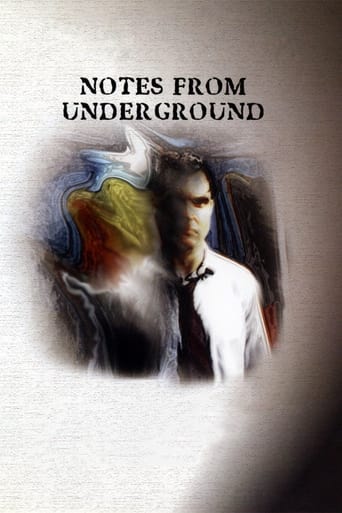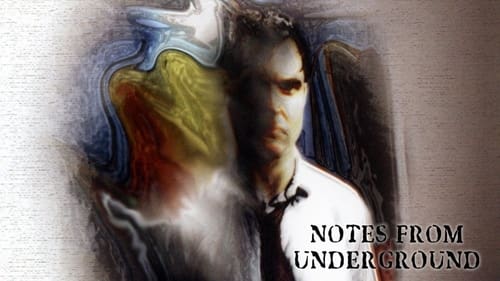inframan
I love this book. It was my bible for years from high school on. Notes From Underground (what happened to the *The*? My text versions always included it) was arguably the first truly modern psychological ontological existential novel, the forerunner to, among other things, Catcher in the Rye & many of Woody Allen's better works.This movie, on the other hand, comes off as nothing more than a very lame imitation of a Steve Martin routine. The lead even looks like Steve Martin but the ancillary characters are barely cardboard in substance. What should have been wryly & universally satirical simply becomes high-school sophomoric.A dreadful disappointment.
mary293
I loved this movie. It is dark, but well acted and I thought quite hilarious (in a life isn't always so great--I wish I could do that kind of way). Henry Czerny possesses such an intensity, "victim" portrayal and convincing self-hatred; it is not difficult to understand why he acts as he does (even though the past wrongs done to him are vague).Anyone who has experienced alienation from a group or hating who they are/what they were doing but couldn't stop the compulsion to cease their behavior, will be able to relate and appreciate the dark humor of this film. I caught it on IFC years ago by accident and my sister and I were both so unexpectedly drawn to the film we could not turn the channel!
john-hurley-2
When I saw this film, I was aware that it was a retelling of a Dostoyevky story but not one I had read it. I still found it a very enjoyable film, which held my attention the whole way.The self-defeating, somewhat neurotic protagonist manages to mess up every opportunity of improving his life that comes his way but manages to do so from a position of either moral or intellectual superiority. He justifies logically all his disastrous decisions and questions the sanity of anything he does that is motivated by emotion. He can't see the point.He vacillates constantly between rejecting everyone around him and craving their love, friendship or forgiveness. Having met the "hooker with a heart of gold" who tidies his flat and, uniquely in the film, shows him respect and love, he drives her away with brutality and insults. In a momentary spell of remorse, he searches for her in the rain-soaked streets and looking back on this act in his video diary asks: "Why did I look for her? If I had found her, I would just have got back with her and tormented her again"The acting is excellent, the photography tight and claustrophobic, which suits the protagonists tiny world. The editing cuts between his direct contributions to video diary, historical narrative and his flights of fancy at various points. It DID make me want to read the book but I think the film a work that stands up well on its own.
krumski
This is a VERY good movie, a surprisingly well-done adaptation and modernization of Fyodor Dostoevsky's novella, "Notes From Underground," where the action is transplanted from 19th century Russia to the Los Angeles of today. Now, this book happens to be one of my all-time favorites so I was very concerned that the movie would be a kind of hip desecration: "How can you separate this story from its roots in the squalor and misery of St. Petersburg and plop it down in La-La land without removing its guts?" I thought. Well, the film somehow manages to do it: watching it, the setting seemed to make perfect sense, as what becomes emphasized is the hero's inability to fit in with the gorgeous and glib Southern California society, and the consequent rage and self-consciousness he feels because of it. This picks up on one strand in Dostoevsky's book, but because of the new setting, enlarges upon it and gives it a new focus.Of course, because of the nature of movies, other aspects of the book had to be shortened or else removed entirely, particularly the extended philosophical and existential monologues the hero spins out in his "notes" (wonderfully converted in the film from a diary format, to a videotaped "confession" - this is perhaps the film's best conceit: once you think about it, it's the obvious solution, but no less inventive for it). The film would have been stronger, and more true to its source, if these videotaped scenes included a bit more philosophical elaboration by the narrator on his motives - twisted though his rationalizations are - because then his actions might become slightly more explicable, particularly to those who haven't read the book.Actually, that brings up an interesting point: can you enjoy, or at least appreciate, this film without having read the book? I'm a little bit too close to the source to say for certain, but my guess would be no. I don't think the film truly does enough to stand on its own, to stake out its own ground which would make sense to an audience unfamiliar with the conceits of the book. This is a shame, since I don't think it would necessarily have taken much more to do this - the rest of the film is so well done. But maybe I'm wrong; I hope I am, because as a study of an insular, cut-off soul (with an absolutely OUTSTANDING central performance by Henry Czerny, one of the most precise and amazingly controlled I've ever seen in a movie), this film definitely deserves to be seen. Whether it's possible to is another story: I saw this in Chicago at an art-house theater and have never been able to find any kind of proof of its existence again, either on video store shelves or in any kind of movie directory listings (until this site, of course).Anyway, good luck finding this film - and if you do, drop me a note and let me know where: I'd love to get a second look at it.





